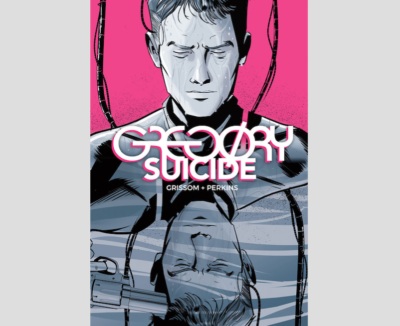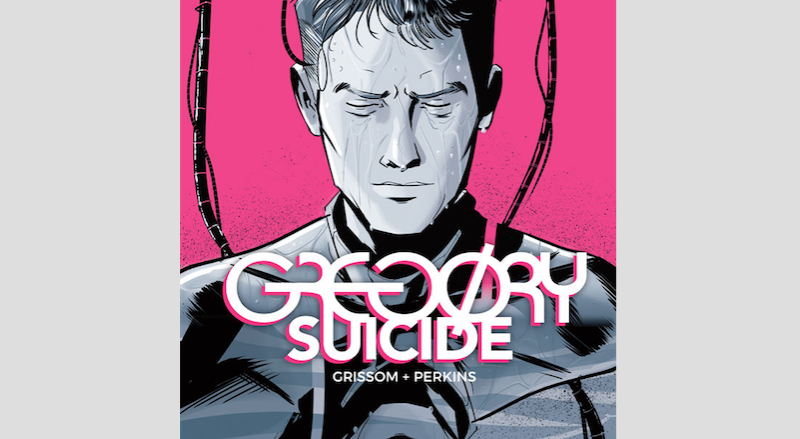INTERVIEW: AI faces haunting nightmares in ‘Gregory Suicide’ graphic novel

Writer Eric Grissom and artist Will Perkins recently released their new graphic novel, Gregory Suicide, from Dark Horse Books. The illustrated narrative tells the story of an artificial intelligence program called Gregory, who wakes up from a technological slumber and faces nightmares of his past lives.
Gregory is never left to sit and ponder his existence. There’s too much mayhem to deal with, and the battles come from the A.I. that replaced Gregory and the humans who want to rid these human-machines from the planet.
This is dystopian perfection, much like the worlds of Philip K. Dick (writer who inspired Blade Runner and Minority Report) and Frank Herbert (Dune). Recently, Hollywood Soapbox exchanged emails with Grissom and Perkins about the new project. Questions and answers have been slightly edited for style.
What was the collaboration like between you two?
Grissom: Will and I had worked with each other before on a short backup for an all ages comic I did called Planet Gigantic. He knows what a pain in the ass I am and for whatever reason has continued to work with me through the years.
Perkins: Easy. I know a lot of artist/writer collaborations can turn into a battle of egos. Eric and I always approached the book from a story-first perspective. So instead of one of us being stubborn or sticking to a vision, Eric would always give me the space to try something out, try to convince him. Luckily the script itself was so tight, it was like reading a movie. You could just see it.
What are you hoping the readers take away from the graphic novel?
Grissom: I’m hoping that people will enjoy the story and the world that it takes place in. Right now there are so many different stories for people to indulge in, just getting them through the door is a victory in and of itself. If Gregory Suicide makes them question their own ideas of self or what being alive means, even better.
Perkins: Mostly that science fiction doesn’t need to be about the end of the world or giant set pieces to be engaging, and that they can be about people. Eric wrote such engaging people I never felt like I was waiting for the next gun fight or explosion to get excited for the work we were producing.
How long did it take to get the rhythm and personality of Gregory as a character?
Grissom: Usually it takes a scene or two before I know who a character is. It’s all about getting them into situations and seeing how they react, what choices they make, etc. Sometimes the hardest part of creating the character is figuring out what it is they truly want. For Gregory, that came pretty quickly.
How do you tell when to let the art fill in the characterization and plot (and thus less dialogue) versus having more speaking / bubbles to fill in the blanks?
Grissom: I write full script, so I know pretty well how a scene will play out visually and when the dialogue needs to take a back seat. I like quiet and reflective moments, so it’s important that it’s not a nonstop chatter fest. Once Will creates the artwork and I am laying in the letters, I do another round of rewrites. At this point, it’s not uncommon for me to cut dialogue I thought I needed or add some when things aren’t as clear as they may need to be.
Were you inspired by other science-fiction stories?
Grissom: Absolutely. I love science fiction and artificial life in particular. Robots, androids, clones, all that. The easy touchstones for Gregory Suicide would be the world of Blade Runner and Battlestar Galactica, but Gregory owes as much to my love of Disney’s Pinocchio. Pinocchio is an artificial boy who messes up again and again. It’s Pinocchio’s mistakes and how he deals with them that ultimately make him human. It’s what we all do. Over and over.
Another inspiration for Gregory Suicide came from the future as it were. I’ve been a lifelong fan of the original Dune book and the ’84 film by David Lynch. After I wrote Gregory Suicide, I ended up reading Dune for a third time and kept going through the series reading all the books I had missed: Dune Messiah, Children of Dune, God Emperor and so on. Frank Herbert introduces a concept of clone-like beings called Gholas that very much mirror some of the ideas I explore in Gregory Suicide. Of course, this aspect of the Dune universe wasn’t a direct influence on Gregory Suicide as I didn’t come across it till after it was written, but it’s so good I can’t not mention it. If someone is a fan of those books, I would recommend you give ours a try.
You have said Gregory Suicide is the hardest project you’ve worked on. Why?
Perkins: Mostly the schedule we had to keep. I was pulling triple duty on Gregory with pencils/inks/and graytones. In addition to my day job and other comic stuff we already had in the pipeline, I don’t think I’ve ever produced as much so quickly. When you draw a comic, there is always that fight between how much time you can devote to each panel and each page and still honor the writing. If I had it my way, I’d still be drawing background robots and citizens or set dressing making it just right, but you always have to keep moving. Making those hard calls for … [the] pace of the scene is the hardest part. Is another layer of rain on a scene going to add enough atmosphere to make the stress of doing double the work as a penciler the next day worth it? Luckily Eric would always dip his head in and give me a thumbs up when I was getting tunnel vision.
Did you have to do a lot of sketching before finalizing the look of the main character?
Perkins: We actually spent a LOT of time on our main guy. You never spend enough. I always feel like 10 pages into a project I want to go back to the ground floor. Like with most of the characters, Eric came to me with a little ‘Bible’ of music and actors to fill in any gaps in his vision, and then we set off. But the trick to someone like Gregory is that he was such an everybody anybody and needed to just kinda blend in — Joe-nobody — but still be sympathetic.
By John Soltes / Publisher / John@HollywoodSoapbox.com
Gregory Suicide is now available from Dark Horse Books. Click here for more information.

